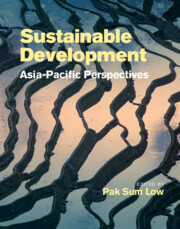Book contents
- Sustainable Development: Asia-Pacific Perspectives
- Sustainable Development: Asia-Pacific Perspectives
- Copyright page
- Dedication
- Contents
- Notes on contributors
- Peer reviewers
- Editor’s note
- Foreword
- Foreword
- Foreword
- Foreword
- Foreword
- Environmental keystones: Remembering Dr Mostafa Kamal Tolba
- Remembering Dr Mostafa Kamal Tolba
- Remembering Dr Mostafa Kamal Tolba
- Acronyms and abbreviations
- SI prefixes
- Unit abbreviations
- Chemical formulae
- Part I Sustainable Development: Theories and Practices
- 1 Asian identities
- 2 On sustainable development
- 3 Sustainability: A scientific dilemma
- 4 Respect and reward: Ecology from the Analects of Confucius
- 5 Sustainable development from an East-West integrative perspective: Eastern culture meets Western complexity theory
- 6 Sustainable urbanism: Measuring long-term architectural merit
- 7 Sustaining wooden architectural heritage
- 8 Green development in China
- 9 Bhutan’s sustainable development initiatives and Gross National Happiness
- 10 A different form of sustainable development in Thailand and Bhutan: Implementation of a sufficiency approach
- 11 The sustainability of food production in Papua New Guinea
- 12 Education for sustainable development: An overview of Asia-Pacific perspectives
- 13 A placemaking framework for the social sustainability of master-planned communities: A case study from Australia
- 14 Poverty, inequity, and environmental degradation: The key issues confronting the environment and sustainable development in Asia
- 15 The challenge of global climate change for international law: An overview
- 16 Sustainable development and climate change negotiations: Perspectives of developing countries
- Part II Sustainable Development: Challenges and Opportunities
- Index
- Endmatter
- References
12 - Education for sustainable development: An overview of Asia-Pacific perspectives
from Part I - Sustainable Development: Theories and Practices
Published online by Cambridge University Press: 23 December 2021
- Sustainable Development: Asia-Pacific Perspectives
- Sustainable Development: Asia-Pacific Perspectives
- Copyright page
- Dedication
- Contents
- Notes on contributors
- Peer reviewers
- Editor’s note
- Foreword
- Foreword
- Foreword
- Foreword
- Foreword
- Environmental keystones: Remembering Dr Mostafa Kamal Tolba
- Remembering Dr Mostafa Kamal Tolba
- Remembering Dr Mostafa Kamal Tolba
- Acronyms and abbreviations
- SI prefixes
- Unit abbreviations
- Chemical formulae
- Part I Sustainable Development: Theories and Practices
- 1 Asian identities
- 2 On sustainable development
- 3 Sustainability: A scientific dilemma
- 4 Respect and reward: Ecology from the Analects of Confucius
- 5 Sustainable development from an East-West integrative perspective: Eastern culture meets Western complexity theory
- 6 Sustainable urbanism: Measuring long-term architectural merit
- 7 Sustaining wooden architectural heritage
- 8 Green development in China
- 9 Bhutan’s sustainable development initiatives and Gross National Happiness
- 10 A different form of sustainable development in Thailand and Bhutan: Implementation of a sufficiency approach
- 11 The sustainability of food production in Papua New Guinea
- 12 Education for sustainable development: An overview of Asia-Pacific perspectives
- 13 A placemaking framework for the social sustainability of master-planned communities: A case study from Australia
- 14 Poverty, inequity, and environmental degradation: The key issues confronting the environment and sustainable development in Asia
- 15 The challenge of global climate change for international law: An overview
- 16 Sustainable development and climate change negotiations: Perspectives of developing countries
- Part II Sustainable Development: Challenges and Opportunities
- Index
- Endmatter
- References
Summary
In the 30 years since the introduction of sustainable development and its acceptance as a concept in education, much can be gained from its successful implementation across the world. It is largely driven by the Brundtland Report of 1987, when the term ‘sustainable development’ (SD) was coined. While much has been achieved since then, there are, however, still a number of gaps, conceptually and in practice, when viewed from the perspectives of indigenous knowledge and wisdom, especially the non-Western-centric worldviews. This can be well observed within the diverse indigenous communities of the Asia-Pacific, such as in Japan, Indonesia, Malaysia, Thailand, and New Zealand. Overall, each provides a unique input to the understanding of SD as a concept and its practice beyond what is conventionally framed by the Brundtland Report. By taking due consideration of the various indigenous perspectives, the vista of SD could be further enhanced and expanded, at the same time enriching the concept through real-life examples, making SD even more relevant and viable as a way of life. Instead of regarding these as divergent views, it is more instructive to integrate them into what has been constructed thus far to generate a more holistic and balanced framework with a higher sense of purpose, as spelt out by the overarching goals of the United Nations Sustainable Development Goals, namely dignity, justice, and partnership, apart from the usual 3Ps of planet, people, and prosperity.
Keywords
- Type
- Chapter
- Information
- Sustainable Development: Asia-Pacific Perspectives , pp. 125 - 138Publisher: Cambridge University PressPrint publication year: 2022
References
- 2
- Cited by

